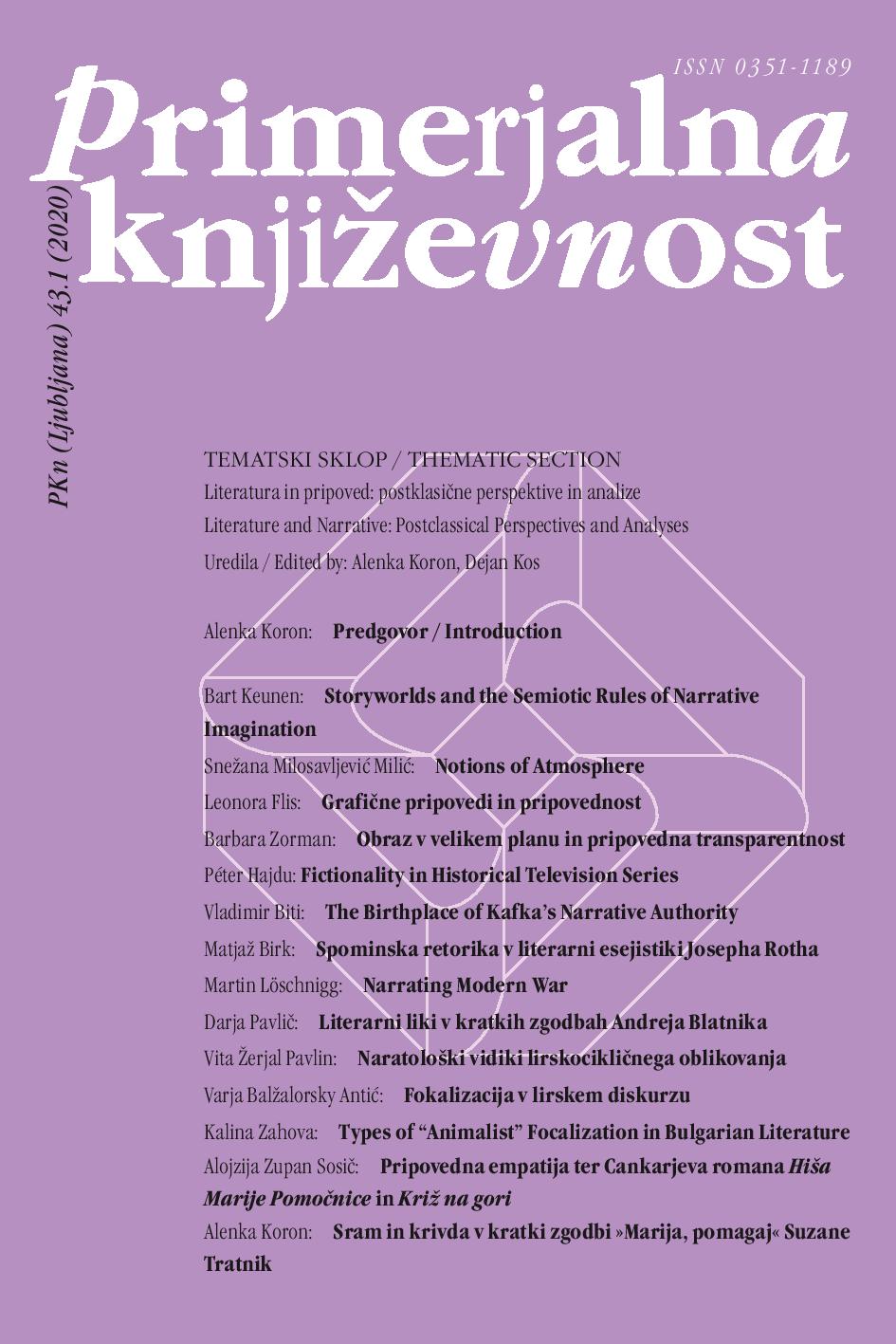Storyworlds and the Semiotic Rules of Narrative Imagination: Peirce and Cassirer as a Starting Point for the Study of Literary World Experience
DOI:
https://doi.org/10.3986/pkn.v43.i1.01Keywords:
postclassical narratology, cognitive theory, semiotics, storyworld, imagination, Peirce, Charles Sanders, Cassirer, ErnstAbstract
With the help of Peirce and Cassirer, this article embeds storyworld theory in a broader phenomenology of narrative imagination. A first step is the semiotic description of narrative imagination; storyworld elements come about through the laws that Peirce attributes to all semiotic processes (section 1). Besides, Peirce’s insights are used to show that those elements significantly differ according to their phenomenological or epistemological nature. From this description of semiotic processes, a matrix of nine different signs will be derived (section 2) that correspond to nine distinct operations of imagination. The hypothesis is that it suffices to attribute a distinct function to each of the nine signs to adequately describe the experience of a storyworld.
References
Andacht, Fernando. “Those Powerful Materialized Dreams: Peirce on Icons and the Human Imagination.” The American Journal of Semiotics 17.3 (2001): 91–116.
Aristotle. Poetics. Trans. S. H. Butcher. London: Macmillan, 1929. The Internet Classics Archive. Web. 12 Dec. 2019.
Atkins, Richard Kenneth. Charles Sanders Peirce’s Phenomenology: Analysis and Consciousness. Oxford: Oxford U.P., 2018.
Barrena, Sara. “Reason and Imagination in Charles S. Peirce.” European Journal of Pragmatism and American Philosophy V-1 (2013). Web. 12 Dec. 2019.
Barthes, Roland. S/Z. Trans. Richard Miller. Malden, MA: Blackwell, 1974.
Baudelaire, Charles. Paris Spleen. Trans. Raymond N. MacKenzie. Indianapolis: Hackett Publishing, 2008.
Bortolussi, Marisa, and Peter Dixon. Psychonarratology: Foundations for the Empirical Study of Literary Response. Cambridge: Cambridge U.P., 2003.
Burke, Michael. Literary Reading, Cognition and Emotion: An Exploration of the Oceanic Mind. New York: Routledge, 2011.
Caracciolo, Marco. “Ungrounding Fictional Worlds: An Enactivist Perspective on the ‘Worldlikeness’ of Fiction.” Possible Worlds Theory and Contemporary Narratology. Ed. Alice Bell and Marie-Laure Ryan. Lincoln: U. of Nebraska P., 2019. 113–131.
Cassirer, Ernst. Essay on Man: An Introduction to a Philosophy of Human Culture. New York: Doubleday, 1944.
Cassirer, Ernst. The Philosophy of Symbolic Forms. 2 (Mythical Thought). 3 (The Phenomenology of Knowledge). 4 (The Metaphysics of Symbolic Forms). New Haven: Yale U.P., 1955, 1957, 1996.
Deleuze, Gilles. Cinéma 1: L’Image-mouvement. Paris: Minuit, 1983.
Dennett, Daniel. “Are Dreams Experiences?” Brainstorms: Philosophical Essays on Mind and Psychology. Cambridge, MA: MIT Press, 1981. 129–148.
Gallagher, Shaun. Enactivist Interventions: Rethinking the Mind. Oxford: Oxford U.P., 2017.
Gerrig, Richard. Experiencing Narrative Worlds: On the Psychological Activities of Reading. New Haven: Westview, 1998.
Gottschall, Jonathan. The Storytelling Animal: How Stories Make Us Human. Boston: Houghton, 2012.
Herman, David. Story Logic: Problems and Possibilities of Narrative. Lincoln: U. of Nebraska P., 2002.
Herman, David. Basic Elements of Narrative. Malden, MA: Wiley-Blackwell, 2009.
Herman, David. Storytelling and the Sciences of Mind. Cambridge, MA: MIT Press, 2013.
Herman, Luc, and Bart Vervaeck. “A Theory of Narrative in Culture.” Poetics Today 38.4 (2017): 605–634.
Hühn, Peter, et al., eds. The Living Handbook of Narratology. Hamburg: Hamburg University. Web. 12 Dec. 2019.
Iser, Wolfgang. The Act of Reading: A Theory of Aesthetic Response. London: Routledge, 1978.
Jannidis, Fotis. “Character.” The Living Handbook of Narratology. Peter Hühn o.c.
Johansen, Joergen Dines. Literary Discourse: A Semiotic-Pragmatic Approach to Literature. Toronto: U. of Toronto P., 2002.
Krois, John Michael. “More than a Linguistic Turn in Philosophy: The Semiotic Programs of Peirce and Cassirer.” SATS 5 (2004): 14–33.
Lakoff, George. “The Neural Theory of Metaphor.” The Cambridge Handbook of Metaphor and Thought. Ed. Raymond Gibbs. Cambridge: Cambridge U.P., 2008. 17–38.
Liao, Shen-yi, and Tamar Gendler. “Imagination.” The Stanford Encyclopedia of Philosophy (Winter 2019 Edition). Ed. Edward N. Zalta. Web. 12 Dec. 2019.
Liszka, James Jacob. A General Introduction to the Semeiotic of Charles Sanders Peirce. Bloomington: Indiana U.P., 1996.
Mar, Raymond A., and Keith Oatley. “The Function of Fiction is the Abstraction and Simulation of Social Experience.” Perspectives on Psychological Science 3 (2008): 173–192.
Miall, David S. “Affect and Narrative: A Model of Response to Stories.” Poetics 17 (1988): 259–272.
Nünning, Ansgar. “Surveying Contextualist and Cultural Narratologies: Towards an Outline of Approaches, Concepts, and Potentials.” Narratology in the Age of Cross-Disciplinary Narrative Research. Ed. Sandra Heinen and Roy Sommer. Berlin: De Gruyter, 2009. 48–70.
Palmer, Alan. Fictional Minds. Lincoln: U. of Nebraska P., 2004.
Peirce, Charles Sanders. The Collected Papers of Charles Sanders Peirce Vols. I–VI. Ed. Charles Hartshorne and Paul Weiss. 2, 3. Ed. Arthur W. Burks. Cambridge, MA: Harvard U.P., 1931–1935 & 1958.
Peirce, Charles Sanders. The Essential Peirce: Volume 1 (1867–1893) and Volume 2 (1893–1913). Ed. The Peirce Edition Project. Bloomington: Indiana U.P., 1992 & 1998.
Richardson, Alan. “Imagination: Literary and Cognitive Intersections.” The Oxford Handbook of Cognitive Literary Studies. Ed. Lisa Zunshine. Oxford: Oxford U.P., 2015.
Ricoeur, Paul. Time and Narrative. 1. Chicago: U. of Chicago P., 1984.
Ricoeur, Paul. “The Function of Fiction in Shaping Reality.” A Ricoeur Reader: Reflection and Imagination. Toronto: U. of Toronto P., 1991. 117–136.
Ryan, Marie-Laure. Possible Worlds, Artificial Intelligence and Narrative Theory. Bloomington: U. of Indiana P., 1991.
Ryan, Marie-Laure. “Possible-Worlds Theory.” Routledge Encyclopedia of Narrative Theory. Ed. David Herman, Manfred Jahn, and Marie-Laure Ryan. London: Routledge, 2005. 446–450.
Sternberg, Meir. “Universals of Narrative and Their Cognitivist Fortunes (II).” Poetics Today 24 (2003): 518–638.
Walsh, Richard. “Dreaming and Narration.” The Living Handbook of Narratology. Ed. Peter Hühn o.c.
Zunshine, Lisa. Why We Read Fiction: Theory of Mind and the Novel. Columbus: Ohio State U.P., 2006.


